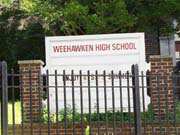On the surface, it would appear last week’s approval of a historic school bill proposed by New Jersey legislators would be a windfall for all school districts in need of help, especially those in dire need of either new building construction or building restoration. The bill, approved overwhelmingly last week by both the state assembly and the state senate, will sink more than $6 billion of state revenue into the state’s 30 designated “special needs” school districts, in order to make improvements to existing facilities. It also calls for another $2.6 billion to be spent in those districts not receiving special need designation, having to do with the affluence of the general population of the district. While some Hudson County “special needs” municipalities, like Jersey City, West New York, Hoboken and Union City, will receive healthy grants provided by the bill, others are pretty much left out in the cold. Such is the case in Weehawken, a township with a school district that really is caught in the middle. It’s not poor enough to receive special needs designation and it’s not affluent enough to survive off lofty tax bills alone. Because Weehawken has not received the “special needs” designation, the Board of Education loses out on the $6 billion windfall and will have to fight with the remaining 580 municipalities in the state for the other $2.6 billion. So while the Jersey City Board of Education stands to receive a whopping $887 million to make school improvements, Union City stands to get $258 million, West New York $78 million and Hoboken $55 million, Weehawken stands to receive very little. “We knew when we applied for the grants that most of the money would go to the special needs districts,” said Richard Barsa, the president of the Weehawken Board of Education. “Unfortunately, the state has treated Weehawken like we’re a very wealthy school district and that’s not the case at all. I anticipate we’ll get 40 percent in aid, but that’s what we were slated to get in state aid before this bill was passed. So there seems to be no benefit at all to us.” Barsa said that Weehawken has received Level B classification in terms of need from the state Department of Education. Other local school districts to receive the same classification include North Bergen, Secaucus, Bayonne and Kearny. “We’re surrounded by special needs districts,” Barsa said. “It’s really not fair that they treat us like we’re wealthy.” Barsa said that when the state began to classify districts as special needs districts about a decade ago, Weehawken would have had to raise its school tax bill by almost 40 percent. “Could you imagine what it would be like?” Barsa said. “We were told that we weren’t taxing up to the necessary level, that we were 40 percent below the level required to be raised by taxes. I couldn’t imagine anyone approving a 40 percent tax increase.” Although Weehawken’s three schools – elementary schools Roosevelt and Webster and the high school – are in decent condition and were renovated as part of a $2 million bond referendum six years ago, Barsa said that there is always room to make improvements. “We still need new windows and we always need work done to the exterior of the buildings,” Barsa said. “It has been six years. And there are other projects to do. Nothing stays forever. If we do a new five-year plan, I guarantee we’ll come up with couple of million in special projects. There are always improvements that we could make.” So while newspaper headlines proclaim a “jackpot” for Hudson County schools and news reports talk about financial windfalls, Weehawken isn’t exactly overjoyed. “We feel very disappointed,” Barsa said. “Some of the surrounding communities have budgets that are 10 percent taxes and 90 percent state aid. We’re the exact opposite and we get punished. It’s very frustrating. And the state cannot continue to compare us to the more affluent communities. And in this case, even the more affluent communities stand to receive more in terms of percentage increases. The state considers districts either rich or poor and there’s no in between. There has to be some middle ground.” Barsa said that he is hopeful that when the next state education rulings come into effect, that there’s some sort of amendment made to consider unique districts such as Weehawken. “Maybe there can be some sort of a sliding scale,” Barsa said. “Something has to be done to consider districts like ours.” Barsa said that the Board of Education will continue to search for all possible funding in the future, in order to maintain the level of excellence the district has enjoyed recently. “The perception of our district has changed dramatically over the last 10 years,” Barsa said. “We’re going to continue to work our tails off to make improvements to our schools.”
Our Digital Archive from 2000 – 2016
